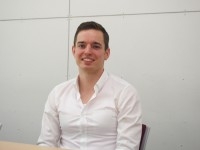Student Voices: If there is something you want to achieve, don’t let failure keep you from trying
Tue, Sep 6, 2016-
Tags
From the United States
- Name: MYERS Corey Adam
- Graduated from: The Georgia Institute of Technology
- Affiliation: Department of Modern Mechanical Engineering (Master’s)
- Awards: Japanese Government (MEXT) Scholarship
Learn more about financial aid
Why did you choose Waseda?
This is actually my second time at Waseda. As an undergraduate student I came to the School of International Liberal Studies (SILS) on an exchange program. My home university is very technical and I wanted to do something besides math and engineering, so I chose Waseda for the SILS program.
After I graduated, I worked for a while, until I decided I needed to do something to help fight climate change. So I started looking for a place in the United States, Europe and Japan. It is a coincidence that the laboratory I really wanted to join, the Nakagaki Laboratory, was at Waseda.
The Nakagaki Lab is unique in my opinion because the professor has strong connections and experience with business. The purpose of the laboratory is to try to curb global warming by capturing CO2 emitted by power plants and steel manufacturers. Most laboratories around the world studying climate change are working from a purely scientific perspective. That is important because sometimes you make discoveries and get insights that you were not expecting. However, in this case we do not have time and we already know exactly what the problem is, so we need to work with the companies who create the CO2 to find a way to stop global warming while also protecting their business interests. When I saw the research being done and the connections that the Nakagaki Lab has, I knew it was a special place where you can create a technology and have it put into use very quickly.
Did you have any concerns before coming to Japan?
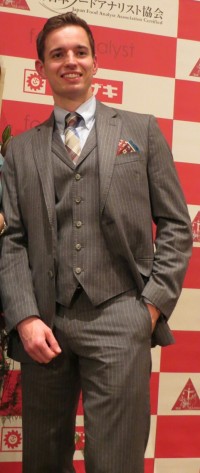 My hometown is very culturally diverse, and I grew up with a lot of different types of people. Even though I lived in Japan for a year before, I was worried that I was going to miss the diversity I enjoyed in Atlanta. When I talk to someone, my personality changes based on their personality. So, if I am always with Japanese people – even though each person is unique – I am always talking to people with generally the same culture. Despite my apprehension, I have already met many people who have a strong interest in different parts of American culture. For example, one of my friends here really likes country music – so, even though I’m not a fan of country music and culture, when I talk to him, I feel like I’m talking to someone in the States and I feel a little less homesick.
My hometown is very culturally diverse, and I grew up with a lot of different types of people. Even though I lived in Japan for a year before, I was worried that I was going to miss the diversity I enjoyed in Atlanta. When I talk to someone, my personality changes based on their personality. So, if I am always with Japanese people – even though each person is unique – I am always talking to people with generally the same culture. Despite my apprehension, I have already met many people who have a strong interest in different parts of American culture. For example, one of my friends here really likes country music – so, even though I’m not a fan of country music and culture, when I talk to him, I feel like I’m talking to someone in the States and I feel a little less homesick.
Did you have any difficulties getting started here?
Of course, there were the normal issues that anyone has when moving to a new city. Most notably, you have to start making a new base of friends. Who can I talk about my love life with? Who can I call to go to the movies? But now I am slowly building my friend network.
How is your life in Japan and at Waseda now?
In America, I quit a very good job, sold my house, and left all my friends and my family to come here. It was kind of a big emotional and financial risk, and I was worried about whether I could do the research I wanted to do. I didn’t know if there would be support for me (technical, emotional, etc). But the people in my lab immediately treated me like family and took care of me. Of course they take me out to have fun but they also support me in my daily life. For example, if I don’t understand something like an apartment lease contract, they always help me. Even though they are all younger, it feels as though they are protecting me. It is really special to feel so welcomed immediately, and I am convinced I made the right decision.
Our professor is very demanding and leads by example. He pushes himself very hard and expects the same from us. Since we see he is trying so hard, it motivates us to do the same. It is very normal to be here on the weekends, every night until 10, 11 or 12. Of course we don’t have to stay so late, but the good motivation from our professor keeps us working hard.
What do you do in your free time?
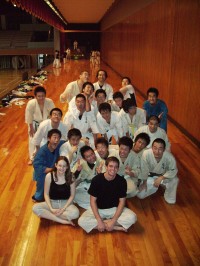 I like martial arts (Sogo-Kakutogi) and karaoke. I sing Japanese songs, like Ulfuls. I do not have so much free time, but when I do, if I am not doing something, it feels wrong.
I like martial arts (Sogo-Kakutogi) and karaoke. I sing Japanese songs, like Ulfuls. I do not have so much free time, but when I do, if I am not doing something, it feels wrong.
How are the relationships with your supervisor and lab members?
Everything is good. They are nice and they try hard. I got really lucky. The people in my laboratory have a good example from our professor for how to work hard. There are 24 members in my laboratory including two international students, a guy from Korea and myself. The English ability of the lab members varies, but mainly we speak Japanese. A lot of our conversations are about science, so most of it can be explained in math, by using formulas. Japanese people are very funny in their own way. Americans are loud and gregarious, but Japanese people have these small facial expressions and unspoken communication that are pretty hilarious.
What is your research about?
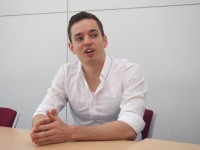 As everyone is aware, climate change has begun and will continue for millennia to come. What most people are unaware of is the severity, immediacy, and irreversibility of the effects. Climate change means rising oceans, famine, floods, droughts, mass extinction, mass human migration, and in all likelihood, war. These effects will be felt by people in all countries in a matter of decades. Unfortunately, political inaction has caused the rate of CO2 release to continually increase, in spite of relatively cheap technological solutions. Moreover, even an immediate, global conversion to zero-CO2 emissions would not stop the climate change that has already begun. Somehow, we must find a way to circumvent political gridlock and prevent future CO2 emissions but also remove what has been emitted since the industrial revolution. CO2 is naturally removed from the atmosphere and oceans when it reacts with magnesium and calcium to form stable carbonates. Unfortunately, this process is extremely slow and will not save us from climate change. However, if this process can be sped up and done for a profit then companies will implement the technology without the need for political action. To make this process profitable I am developing methods to use waste products from industry as feedstock and to concurrently generate products for resale to industry. In this way, the overall process can be made financially viable and a global industry of CO2 capture and conversion can be realized.
As everyone is aware, climate change has begun and will continue for millennia to come. What most people are unaware of is the severity, immediacy, and irreversibility of the effects. Climate change means rising oceans, famine, floods, droughts, mass extinction, mass human migration, and in all likelihood, war. These effects will be felt by people in all countries in a matter of decades. Unfortunately, political inaction has caused the rate of CO2 release to continually increase, in spite of relatively cheap technological solutions. Moreover, even an immediate, global conversion to zero-CO2 emissions would not stop the climate change that has already begun. Somehow, we must find a way to circumvent political gridlock and prevent future CO2 emissions but also remove what has been emitted since the industrial revolution. CO2 is naturally removed from the atmosphere and oceans when it reacts with magnesium and calcium to form stable carbonates. Unfortunately, this process is extremely slow and will not save us from climate change. However, if this process can be sped up and done for a profit then companies will implement the technology without the need for political action. To make this process profitable I am developing methods to use waste products from industry as feedstock and to concurrently generate products for resale to industry. In this way, the overall process can be made financially viable and a global industry of CO2 capture and conversion can be realized.
What are your plans after you finish your degree?
Save the world!
I mean the world is going to be OK. People might not be OK. People might more or less go extinct, and that might actually be better for the world. But for now, I will try to save the quality of life and knowledge that people have built up to this point from the effects of climate change.
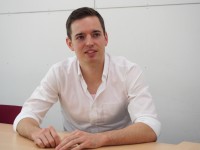 I do not know where I will go. If I can make some good technology, then I will go to wherever it can be implemented. My goal is to make a technology that can be run as a company. That being said, it’s not possible for a single company to reduce CO2 emissions enough for the whole world. So, my plan would be to spread the technology and help other companies to use it.
I do not know where I will go. If I can make some good technology, then I will go to wherever it can be implemented. My goal is to make a technology that can be run as a company. That being said, it’s not possible for a single company to reduce CO2 emissions enough for the whole world. So, my plan would be to spread the technology and help other companies to use it.
Do you have any advice for prospective students?
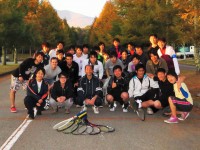 The ache of regret is unbearable and only ends when you die. The pain of failure is temporary and muted if you have made a sincere effort. So, if there is something you want to achieve, recognize and accept the potential for failure, but don’t let it keep you from trying. If you let your ambitions be quelled by caution, doubt, or social pressure then you have to live with the knowledge that you are a coward. If you honestly strive for whatever goal you have the worst thing that can happen is you live with the knowledge that you weren’t good enough, but you are still better than most because you actually tried. And who knows, you might just succeed!
The ache of regret is unbearable and only ends when you die. The pain of failure is temporary and muted if you have made a sincere effort. So, if there is something you want to achieve, recognize and accept the potential for failure, but don’t let it keep you from trying. If you let your ambitions be quelled by caution, doubt, or social pressure then you have to live with the knowledge that you are a coward. If you honestly strive for whatever goal you have the worst thing that can happen is you live with the knowledge that you weren’t good enough, but you are still better than most because you actually tried. And who knows, you might just succeed!
Related Video
Created for prospective students overseas who are unfamiliar with Waseda University and Japan as a whole, aiming to share the attractive features of studying at Waseda University in Tokyo. Watch this video


